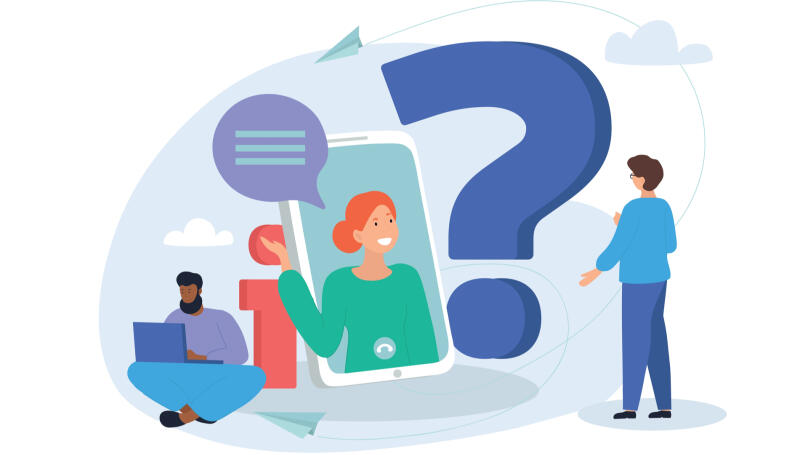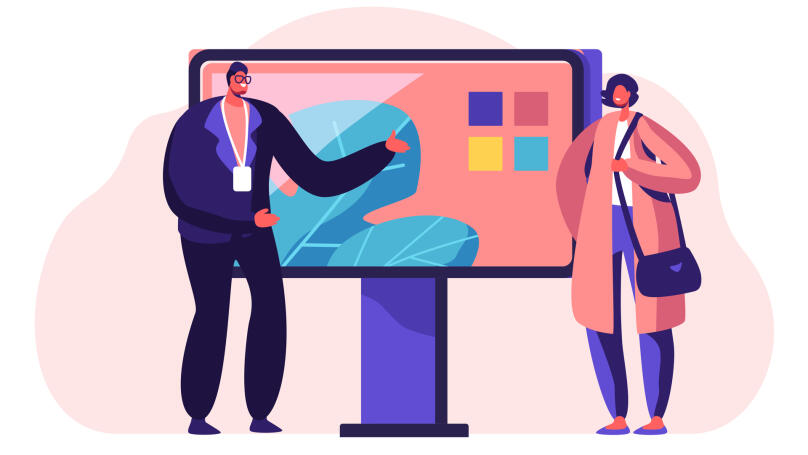Open-ended sales questions
What are open-ended questions?

Open-ended questions are questions that require a detailed answer in response. To explain it further, open-ended questions are distinguished by the fact that they cannot be simply answered with a "yes" or "no". Therefore, open-ended, and closed-ended questions vary in the way they can be answered. For example, it is impossible to respond with either a "yes" or a "no" to the following question, "What exactly do you need a laptop for?" This is an example of an open-ended question.
Open-ended questions are used both in everyday life and at work. Often, open-ended questions are used in marketing, business, business communication, or social surveys. You might also hear open-ended questions during a job interview. Open-ended questions are regularly asked in sales. They may also be an integral part of a marketing research study and asked directly when communicating with customers.
Open-ended questions are extremely useful in sales. When people answer open-ended questions, they provide much more information than when answering a closed-ended question. Although, when you use these kinds of questions in an interview or perhaps a questionnaire, it is not usually a great idea. A customer may be simply reluctant to answer the question in any more detail, and as a result, a salesperson may not receive any information at all. You need to ask open-ended questions in sales at the right time and in the right way.
How to ask open-ended sales questions?

Open-ended questions are used when selling a product or changing a sales strategy: identifying customers' needs, and understanding why their behaviour has changed. It is best to ask open-ended questions during a conversation. For example, there will be more chances that a person will answer questions in greater detail during an interview. If a question is answered in writing, however, the chances of obtaining a full answer will be substantially reduced.
The open-ended question method is frequently used in marketing research to identify customer's needs and discover the extent to which the product meets them. It is worth examining and asking open-ended questions to identify customers' needs before writing any sales scripts: a thorough understanding of customer needs will help you write more efficient and effective scripts.
You can also ask open-ended questions directly when selling a product - for example, ask a customer at the very start of the conversation, "What are you looking for?" With open questions, the salesperson can show the customer that they care, and help the former learn more about the customer's wishes and objections.
The type of open-ended questions that a salesperson asks when communicating with a customer is largely dependent on their sales technique.
Different types of open-ended questions

Different types of open-ended questions can be distinguished depending upon the sales method used in different situations. For example, when using the SPIN sales technique, four types of questions are used: situational, problematic, implicational, and need pay-off.
One way or another, problem-solving questions are currently being used in almost every sales technique. Such open-ended questions in sales identify needs that are useful for every company. However, it's not worth asking only one question regarding the problem the customer wants to find a solution for, when using a product, or the anticipated purpose of the purchase. You need to use different wording. A customer answers the questions asked by the salesperson. If there is ambiguity or inaccuracy in the wording of the question the salesperson will not be able to gather the information they need.
The main disadvantage of open-ended questions is that they may be difficult to ask and to be understood properly. The very concept of "open-ended question" means that the customer has plenty of freedom to answer the questions or to reveal relevant information to the salesperson. You can learn how to ask such tricky questions correctly only through experience.
Examples of open-ended sales questions

Sales staff generally start off their introductions with a customer using questions concerning the purpose of their visit to the store or the reason for their search. For example:
- How can I help you?
- What would you like to buy?
Thanks to these kinds of questions, the salesperson can discover the purpose of the customer's visit and help them find the perfect goods. However, it is not the only reason for using open-ended questions. With the help of open-ended questions, you can gather all sorts of information about a customer, which is particularly crucial when working through objections. For example, if a salesperson notices that the customer cannot make up their mind about the purchase, then they can ask the following questions:
- Is there something about the product that you are unsure of?
- Is there something holding you back from purchasing the product?
When it comes to using open-ended questions to sell high-end products, for example during car sales, they are essential to help with customer's objections, if there are any. They will also eventually encourage the customer to make a purchase. However, sometimes the best possible solution is to offer the customer an alternative suitable for their budget or to meet other expectations of the customer.
If you would like to create an open-ended question, then it's a safe bet to start by using questioning words (for example, "how" and "why"). However, an alternative way to ask a customer an open-ended question is to simply invite them to share their experience. Questions like this will help you discover more about the customer's dilemma and establish a rapport with them.
Open-ended questions are an excellent tool to connect with a customer and help you work through any objections. However, the right judgment is that open-ended questions alone are not enough to sell a product. Thanks to the assistance of open-ended questions, you will gather a lot more information from a customer. Closed-ended questions, however, are still needed to determine whether the salesperson understands the answers correctly and identifies customer needs accurately.























